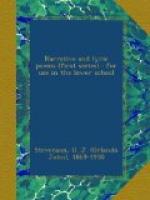Still the Captain continued, unheeding the words of the stripling:
“See, how bright they are burnished, as if in an arsenal hanging; 35
That is because I have done it myself, and not left it to others.
Serve yourself, would you be well served, is an excellent adage;
So I take care of my arms, as you of your pens and your ink-horn.
Then, too, there are my soldiers, my great, invincible army,
Twelve men, all equipped, having each his rest and his matchlock, 40
Eighteen shillings a month, together with diet and pillage,
And, like Caesar, I know the name of each of my soldiers!”
This he said with a smile, that danced in his eyes, as the sunbeams
Dance on the waves of the sea, and vanish again in a moment.
Alden laughed as he wrote, and still the Captain continued: 45
“Look! you can see from this window my brazen howitzer[13] planted
High on the roof of the church,[14] a preacher who speaks
to the purpose,
Steady, straightforward, and strong, with irresistible logic,
Orthodox, flashing conviction right into the hearts of the heathen.
“Now we are ready, I think, for any assault of the Indians: 50
Let them come, if they like, and the sooner they try it the better,—
Let them come if they like, be it sagamore, sachem, or powwow,[15]
Aspinet, Samoset, Corbitant, Squanto, or Tokamahamon!”
Long at the window he stood, and wistfully
gazed on the landscape,
Washed with a cold gray mist, the vapory
breath of the east wind. 55
Forest and meadow and hill, and the steel-blue
rim of the ocean,
Lying silent and sad, in the afternoon
shadows and sunshine.
Over his countenance flitted a shadow
like those on the landscape,
Gloom intermingled with light; and his
voice was subdued with emotion,
Tenderness, pity, regret, as after a pause
he proceeded: 60
“Yonder there, on the hill by the
sea lies buried Rose Standish;
Beautiful rose of love, that bloomed for
me by the wayside!
She was the first to die of all who came
in the Mayflower!
Green above her is growing the field of
wheat we have sown there,
Better to hide from the Indian scouts
the graves of our people, 65
lest they should count them and see how
many already have perished!”
Sadly his face he averted, and strode
up and down and was thoughtful.
Fixed to the opposite wall was a shelf
of books, and among them
Prominent three, distinguished alike for
bulk and for binding;
Barriffe’s Artillery Guide, and
the Commentaries of Caesar, 70
Out of the Latin translated by Arthur
Goldinge of London,[16]
And, as if guarded by these, between them
was standing the Bible.
Musing a moment before them, Miles Standish
paused, as if doubtful




